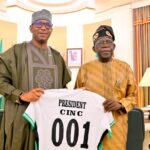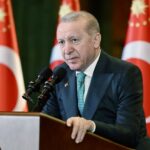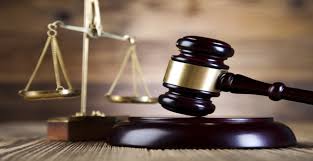By Ebere Agozie
A Senior Advocate of Nigeria JB Daudu, SAN, has urged the National Assembly to maintain the status quo of the burden of proof provision in election cases in the proposed electoral act amendment.
Daudu gave the charge in an interview with the News Agency of Nigeria (NAN) on the sideline at the send-forth ceremony in honour of the 42nd Set of Externs in his Abuja office.
NAN recalls that the National Assembly had declared that as part of the proposed electoral reforms, it will cause INEC to assume the burden of proof that the election in issue was validly conducted.
He warned that the burden of proof in election cases should not be tampered with or distorte, but must remain with the petitioner.
The legal luminary said that the issue of neutrality of the electoral empire will clearly smear the reputation of the new INEC Chairman.
“The INEC chairman does not have the manpower for the task that the National Assembly is about to heap on his shoulders’’.
He argued that such a measure could permanently damage the avowed neutrality of INEC.
He noted that one of the foundational roles of INEC is to act as an impartial umpire in the electoral process, including in post-election dispute resolution.
“This means that INEC must discharge its duties without favour or bias toward any candidate or party, must not act in support of a contestant in the election it is supervising, and must maintain the perception and reality of fairness even after the elections.
“Once INEC is made to discharge the burden of proof, it means that INEC could align itself with the respondent who was declared as elected to prove or validate his due election or return.
“This will create an untoward situation, where most of those who are in the senate today, will just fold their arms and do nothing after ‘winning’ their seats expecting INEC to defend the petitions against them”.
Daudu averred that where a person challenges the result of an election, the law presumes that the declared result is correct and therefore the petitioner must bring credible evidence to rebut that presumption.
“The question now is, should the burden of proof be reversed and the onus placed on INEC to prove that there were no malpractices or non-compliance which prevented the Petitioner from winning the election.
“Or the presumption that the result declared by INEC is correct automatically removed or displaced and INEC become both the beautiful bride and lord of the manor.
“It means that all elections are suspect or invalid including those of the president and governors, until the contrary is established by INEC’’.
He noted that the nature of the allegations in the petition determines the standard of proof incumbent on the petitioner to discharge at the hearing of the petition.
He said that where it is a mere non-compliance with electoral laws the standard is the balance of probabilities but where an allegation of a crime is central to it, the standard is beyond reasonable doubt.
“So, the question is what happens to this established standard of proof should the legislature upturn the burden of proof.
“Would INEC be willing to go the whole nine yards to assist a petitioner to prove his allegations or will they merely sit back in cahoots with the winner, and watch the petitioner’s case crumble.
“This contrivance is just a device by winners to kill off election petitions,’’ he added.
He said that the present arrangement is that once a litigant applies for processes or materials used by INEC for the conduct of the election, the electoral body will provide parties with such materials applied for.
“This could be in the form of certified true copies of ballot papers, election results such as the forms EC8 series and other electoral forms upon the payment of the prescribed fees.
“If the onus of proof is inverted and the lawmakers insist that INEC should provide them with these materials at no cost to them, then it will be clear that INEC will never have the manpower or resources to discharge that burden.
“The whole election petition process will not only grind to a halt, but unimaginable chaos will erupt and it is only then that the country will know and appreciate the critical role that the Tribunals and Appeal Courts play in dissipating the tension caused by electoral contests’’.
The learned silk suggested that the reversal of the onus of proof will completely wipe out the pedestal on which the electoral architecture is based.
“The election result is ascertained in a pyramid form with the base being the polling station. Both the Electoral Act 2022 and the 2025 Bill maintained that architecture.
“It allows the collation of results to proceed from polling stations to the ward then to the Local Government and on to the state and for presidential elections to the National Headquarters of INEC.
“The results are admissible in evidence without the necessity of their being certified by INEC’’.
He argued that the availability of these election materials first hand to all the contestants knocks the bottom out of the argument of the senate that INEC usually suppresses election results.
According to him, the argument of the senate that INEC usually suppresses election results also does not hold water as the new bill acknowledges this process or procedure in section 60 of the act.
“This section regulates how votes are counted, recorded, and transmitted after polling.
“It mandates that results be entered in official forms, duly signed by the presiding officer and polling agents, announced publicly at the polling unit, and transmitted both electronically and manually.
“It also creates an offence for any presiding officer who deliberately violates these procedures.
“It institutionalizes transparency and creates multiple layers of accountability, making it easy for any petitioner to obtain certified true copies of results and demonstrate discrepancies where they exist’’.
The learned silk argued that shifting the burden of proof to INEC, despite the above built-in mechanisms would be contrary to both logic and law.
“Juxtaposing all the points made above, who is now responsible for the low level of electoral maturity in Nigeria?
“Is it the electoral umpire INEC or the law courts that adjudicate over electoral disputes, or politicians who present themselves from time to time for election into political offices?
“Who out of the listed groups, engages in vote buying, employs thugs and other violent persons to disrupt elections, manipulates the electoral system in all the ways frowned against by law.
“We all know the answer and until our politicians find the courage and candour to participate in free and fair elections we, we will continue to be victims of manipulation and buck-passing,’’ he added.












